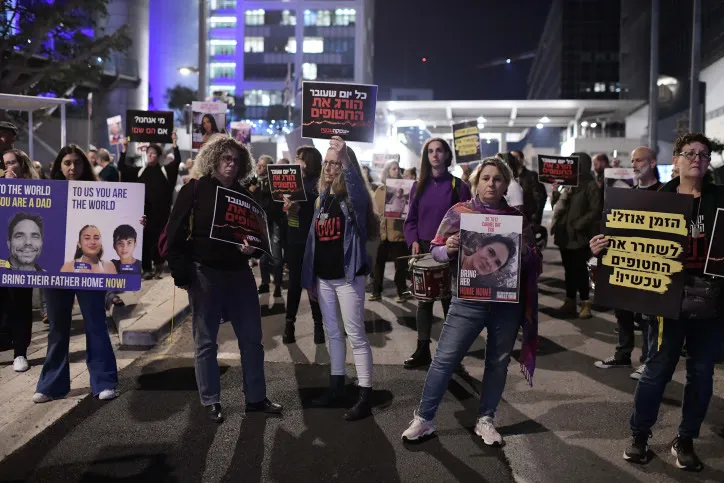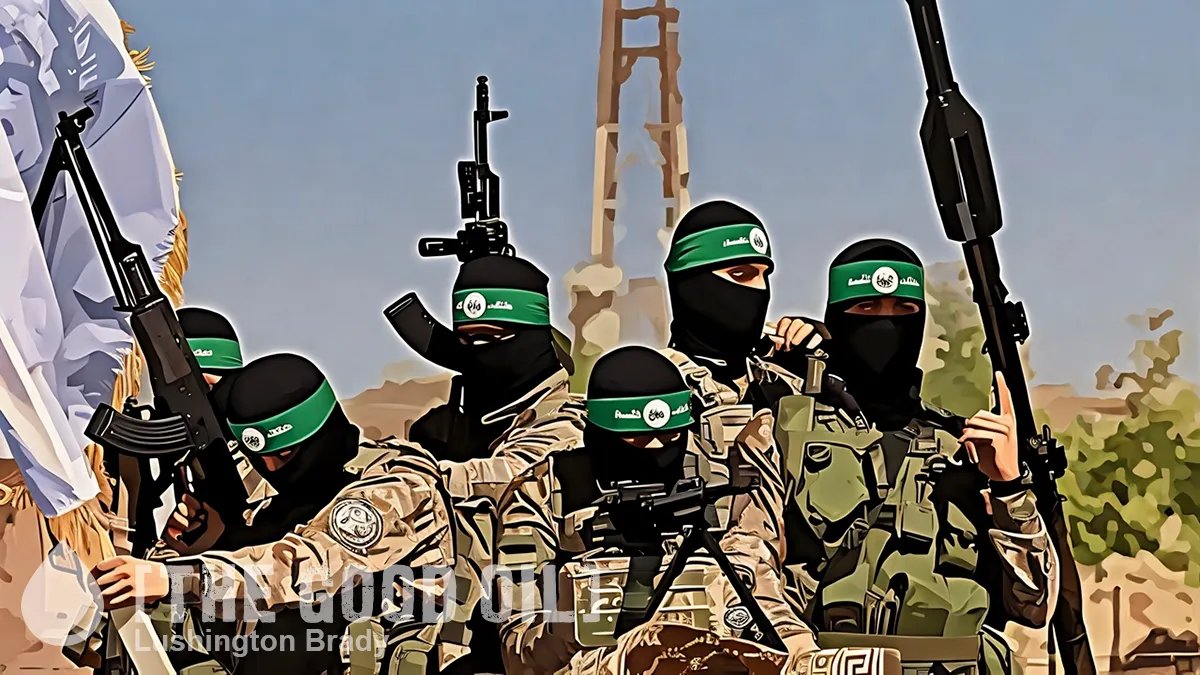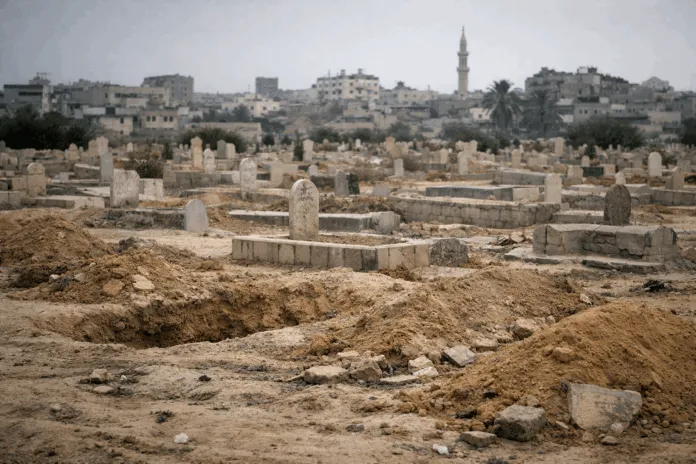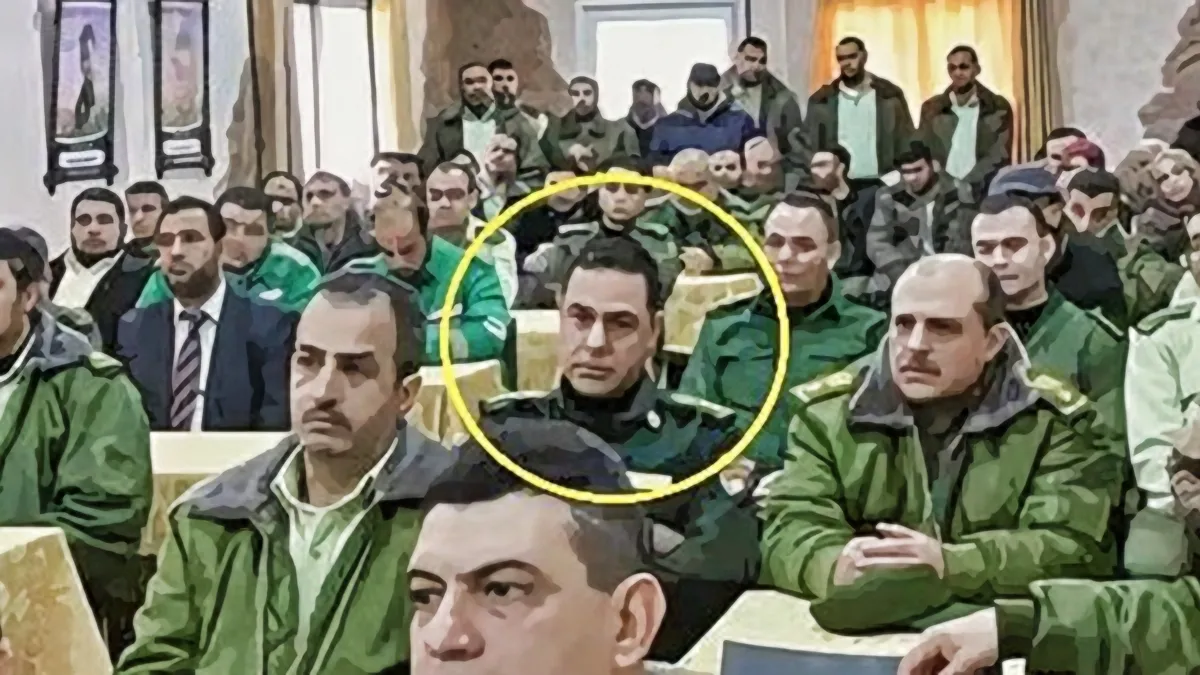Table of Contents
BICOM
BICOM provides accurate, timely and balanced information that is read by officials, experts, journalists and many others.
What’s happened: In London, Eli Albag, father of 18-year-old Liri; Ziv Abud, girlfriend of 26-year-old hostage Eliya Cohen; and Liran Berman, brother of 26-year-old twins Ziv and Gali Berman met with Prime Minister Sunak and Foreign Secretary Cameron.
- Albag told Israeli media, “we received a warm embrace from the prime minister and from David Cameron, and the understanding and action that they intend to take. Our message is to put pressure on everyone, on our own prime minister to reach a deal willingly and, on the other hand, we asked them to pressure the Qataris.”
- Separately, the UK government announced that along with the US and Australia they have imposed “coordinated sanctions” on five key Hamas and Palestinian Islamic Jihad (PIJ) figures to target their financial networks.
- Foreign Secretary Cameron said, “These sanctions send a clear message to Hamas – the UK and our partners are committed to ensuring there is no hiding place for those financing terrorist activities. To reach a sustainable ceasefire in Gaza, Hamas can no longer be in power and able to threaten Israel. By disrupting the financial networks which sustain Hamas’ operation, including from Iran, these sanctions support that crucial aim.”
- In Gaza, following manoeuvres over the last few weeks across Khan Yunis, the IDF advanced its operations in the western part of the city and completed its encirclement.
- IDF Spokesperson Hagari described the combat in “very complex terrain, densely populated with many Hamas terrorists concealed in the area, including in sensitive facilities, trying to surprise our forces.”
- He confirmed that over recent days the IDF “destroyed a tunnel network spanning a kilometre and a half as well as a rocket production facility. We eliminated over 100 terrorists in western Khan Yunis in the last day.”
- The underground rocket manufacturing site was the largest one found in southern Gaza.
Context: In December 2023, alongside new sanctions on Iran, the UK imposed sanctions on seven Hamas-linked individuals – “key figures in the network that has financed Hamas, including individuals in Lebanon and Algeria. These stringent measures,” the government said, “show that individuals linked to Hamas will not be able to escape accountability, even if they are operating from outside of Gaza.”
- The disaster on Monday where 21 IDF reservists were killed occurred as part of the operation to create a one-kilometre-deep “buffer zone” along the length of the Gaza Strip.
- The attack took place just 600 metres inside the Strip, adjacent to Kibbutz Kissufim, one of the areas from which the terrorists entered Israel on October 7th.
- The buffer zone aims to create a sterile zone without any buildings that could serve as a base from which to launch future attacks, and is seen as a vital component to reassure residents of the Gaza periphery to eventually return to their homes.
- According to the IDF, there were 2,850 buildings in proximity to the fence, of which the IDF has already destroyed around 1,100.
- Overall, the latest IDF assessment is that 17 of the original 24 Hamas battalions have been critically damaged and their command and control disrupted.
- The remaining battalions are the focus of the fighting in Khan Yunis, plus in the areas of Rafah and in the southern edge close to the Egyptian border.
- Despite losing their fighting formation, Hamas fighters have returned to their founding principles and remain able to operate as small cells, taking advantage of their remaining access to the tunnel shafts to attack IDF soldiers with anti-tank missiles and improvised explosive devices.
- According to the latest IDF assessment, around 10,000 Hamas fighters have been killed. Hamas figures cite over 25,000 Gazans killed, without making a distinction between combatants and civilians.
- IDF efforts to destroy Hamas’s overall control of the Strip are ongoing, with most senior Hamas leaders remaining at large.
- There are reports in the international media that Israel and Hamas are close to reaching a new deal to release the hostages, again in stages in return for a pause in fighting and a higher ratio of Palestinian prisoners in return. There has been no official Israeli response to these reports.
Looking ahead: Foreign Secretary Cameron will visit Israel and the Palestinian Authority again this week. His trip will also include stops in Qatar and Turkey.
- According to the FCDO, his focus will be to “get more aid into Gaza, hostages out and reach a sustainable, permanent ceasefire.”
- The statement adds, “the Prime Minister and Foreign Secretary have set out the necessary elements for progress – Hamas must agree to the release of all hostages, they can no longer be in charge of Gaza and the threat from their terror and rocket attacks must end. An agreement must also be put in place for the Palestinian Authority to return to Gaza in order to provide governance and services and, increasingly, security.”
BICOM Background Briefing: Operation Swords of Iron
BICOM published a comprehensive background briefing on Operation Swords of Iron, including background on Hamas, Israeli policy on Gaza, and Israel’s obligations under international law. Read the full briefing here.
PODCAST
Episode 225 | Who are the Houthis?
In this episode, Richard Pater speaks to Inbal Nissim-Louvton, an expert on Yemen. They discuss the Houthis’ foundation and their emergence as a social and political power. Inbal presents their ideological roots and gives her assessment on the current political environment in Yemen. She also relates to the Houthis’ regional role and their connections to Iran and the Palestinians. Inbal Nissim-Louvton teaches at the Department of History, Philosophy and Judaic Studies at the Open University in Israel and is a Research Associate at the Forum for Regional Thinking.
Listen on Apple Podcasts, Spotify and Google Podcasts
NEW ARTICLE
Peacebuilding Special Issue | A Multilateral and Bottom-Up Approach to End the Israeli-Palestinian Tragedy
Top stories from the UK and Israeli media
The BBC, The Telegraph, The Times, The Guardian, The Independent, Sky News, Reuters, the Evening Standard, The Sun, Channel 4 and The Financial Times all report 24 Israeli soldiers killed in Gaza on Monday – the deadliest day for IDF forces since their ground operation began. That includes 21 reservists who died in an explosion likely caused by Hamas fire hitting mines that Israeli forces had placed in two buildings to demolish them.
The Guardian reports on the political challenges Netanyahu is facing, including that the relatives of hostages still in Gaza are growing more vocal. In recent days they blocked a motorway and disrupted a committee hearing in parliament.
The Guardian and Sky News publish articles on Israeli teenager Tal Mitnick, who has repeatedly refused to serve in the IDF.
The Guardian and The Times report that David Cameron will return to the Middle East on Wednesday to press for an immediate humanitarian pause in the fighting. Downing Street said Cameron was expected to raise “the importance of a two-state solution”. The foreign secretary, who said the situation in Gaza is desperate, is due to visit Qatar, Israel, the West Bank and Turkey.
The Guardian, The Telegraph and The Financial Times also report that Israel’s “clear and repeated rejection of the two-state solution” is unacceptable, and could only prolong the conflict in Gaza, the UN secretary general, António Guterres, has said, at the launch of a highly charged security council debate focusing on aid shipments to Gaza.
Anshel Pfeffer in The Times assesses whether Israelis generally still support the war in Gaza, including how some hostages’ families are leading calls for a ceasefire.
The Financial Times publishes an editorial, saying: “After more than three months of Israel’s devastating Gaza war, Arab states are developing a plan they hope will bring an end to the conflict and lay the foundations for a sustainable peace. At the core of the US-backed initiative is to offer Israel a prize it has long sought: the normalisation of relations with Arab and Muslim states, including the grand prize of Saudi Arabia. In return, Israel would have to commit to ‘irreversible’ steps towards the establishment of a viable Palestinian state. The premise of the plan, which is expected to be unveiled within weeks, is simple. There can only be a durable peace in the Middle East if the protracted Israeli-Palestinian conflict, which has fuelled instability in the region for 75 years, is resolved in a manner that delivers Palestinians the dignity, freedom and homeland they have long sought. But the challenge of securing any such agreement — something that has eluded some of the world’s sharpest diplomatic minds over the years — is anything but.”
The Financial Times publishes an explainer on the ICJ and unpacks what the court case may mean for Israel.
The BBC reports that the IDF says its ground forces have encircled Khan Younis, the southern Gaza Strip’s largest city. Troops have also reportedly advanced deeper into remaining parts of the city, where they believe Hamas leaders are hiding in tunnels with hostages. Residents said tanks had shut the last road out of the city to the Mediterranean coast, effectively stopping them from fleeing southwards.
The BBC reports on an aspect of our main item, speaking to the father of one of the hostages still in Gaza: “I wake up in the morning alive and go to sleep dead. Each day,” says Eli as he tries to cope with the pain of 18-year-old Liri’s ordeal, and his own inability to keep her safe. Standing outside the Houses of Parliament, he holds two images of Liri, before and after she was taken captive. The contrast is heartbreaking. In the latter – a still from a video made by Hamas after the capture – Liri looks dishevelled, with dirt pictured on her face and hoodie.
The Telegraph reports that Hamas has reportedly rejected an Israeli proposal for a two-month ceasefire in Gaza in exchange for the release of all remaining hostages held by the terror group. A senior unnamed Egyptian official told the Associated Press that Israel had proposed the pause in fighting to allow for the more than 130 captives to be freed, in return for the release of Palestinians imprisoned by Israel. Reuters adds that Israel and Hamas broadly agree in principle that an exchange of Israeli hostages for Palestinian prisoners could take place during a month-long ceasefire, but the framework plan is being held up by the two sides’ differences over how to bring a permanent end to the Gaza war, three sources said.
The Telegraph reports that Israel will find itself “sinking in the Gaza mud for years to come” if Benjamin Netanyahu maintains his fragile grip on power, Ehud Barak, the country’s former prime minister and most highly decorated soldier told the paper.
Danny Cohen comments for The Telegraph on supposed bias against Israel inside the BBC, saying the evidence is “overwhelming”.
Roger Boyes in The Times writes on Iran: “This is not a coherent conservative grouping, nor is it the embryo of a future political class. But its various players can see time is running out. Its last big gamble: that the US, terrified of an expanding regional conflict, will put pressure on Israel to accept a ceasefire. Iran thus aims to simulate preparations for just such a war, waiting for a panicked Joe Biden’s diplomatic intervention and finding a way of declaring a ‘victory’ that can keep the cushioned revolutionary guardians going for as long as it takes to pay their children’s university fees abroad.”
The Sun publishes: “Israeli forces said they have discovered another Hamas tunnel where 20 hostages were allegedly held in inhumane conditions. Chilling photos shared by the IDF appear to show cages, filthy mattresses, and children’s drawings inside the terror hellhole in southern Gaza’s Khan Younis.”
Ynet publishes profiles of many of the 21 Israeli soldiers who fell on Monday when two RPG missiles fired by Hamas terrorists hit a tank and boobytrapped buildings in the central Gaza Strip. They include:
“Sergeant First Class (res.) Cydrick Garin, 32, from Tel Aviv, was born in the Philippines and left school behind at a young age to help support his mother, who did not know a word of Hebrew. When he became a teenager, his life deteriorated to the point where he was drawn to crime and eventually arrested at his home, in front of his mother. ‘… I finally told myself I need to change my life,’ he said in an interview in 2021. He was recognised by the IDF Southern Command as an outstanding soldier in the unit in April 2021.”
“Sergeant First Class (res.) Yoval Lopez, 27, from Alon Shvut, is survived by a wife and three daughters, the youngest of which is 7 months old. His wife, Sigalit, received the bitter news in the middle of the night. Samaria council head, Yossi Dagan, said: ‘Yoval fell while protecting his homeland, leaving a massive void in our hearts. We will accompany Sigalit and the family for as long as it takes.’” Haaretz adds that two of Lopez’s brothers are also serving, one in Jenin and the other in Gaza.
“Sergeant First Class (res.) Ahmad Abu-Latif Ahmad, 26, from Rahat, a well-known and beloved person within the Ben-Gurion University in Be’er Sheva, was employed in the school’s security department. He is survived by his wife, daughter, parents, and 11 siblings. In a post he published several weeks into the war, he wrote: ‘I was driving with my brother-in-law on October 9 and we had received messages about terrorists infiltrating the Mishmar HaNegev region. As we are professionally trained and armed security personnel, we drove right over and started scouring the area for terrorists. The Bedouin community mourns those who have fallen victim through no fault of their own. We share the same fate and must remain united.’”
Haaretzalso profiles the fallen: “Sgt. Maj. Matan Lazar worked as a nurse at the Assaf Harofeh hospital for about five years, mentoring students and new employees in the emergency medicine department and the hospital’s nursing school.”
“Master Sgt. Elkana Vizel was married to Galit and a father to four children. He worked as a teacher at the Noam Bnei Dekalim school, where his wife also works. He left behind his parents Benjamin and Gila and his twin brother Itamar. In the letter he left before going into battle, Viesel wrote: ‘If you are reading these words, something must have happened to me. If I have been captured by Hamas, I demand that you do not make any sort of deal involving the release of terrorists to release me. Our victory is more important than anything, so please just keep going with all your might so that our victory is as definitive as possible… When a soldier falls in battle it’s sad. But I ask you to be happy. Don’t be sad when you say goodbye to me. Sing a lot, hold on to each other’s hands and strengthen one another. We have so much to be proud of and happy about, we are a generation of redemption! We are writing the most significant moments in the history of our nation, and of the entire world. So please be optimistic. Keep choosing life all the time. A life of love, hope, purity and optimism. Look your loved ones in the eye and remind them that everything they go through in this life is worth it. And that they have a lot to live for. Live! Don’t stop the force of life for a moment! I was already wounded in the 2014 Gaza War. I had the choice to stay behind, but I don’t regret for a moment that I went back to being a combat soldier.’”
Of Monday’s total troops casualties of 24, Yediot Ahronot’s Sima Kadmon writes: “Twenty-four young men with parents, wives and children, girlfriends and fiancés, brothers and sisters. Twenty-four people with dreams and plans for a bright and promising future that was cut short in a single moment. Twenty-four families that were devastated overnight. More orphans. More babies who will never know their father. More young widows who have lost the love of their life. Twenty-four photographs of young faces that have now been added to the large gallery of photographs of people who will never grow old… People who dropped everything and left their families, studies, jobs and overseas trips behind in order to save the State of Israel. The life story of every single one of those soldiers is heartbreaking. An entire world that was cut short so early on. It seems as if the best people were chosen to die in order to remind us of what we long ago forgot: what wonderful people we have here.”
Yediot Ahronot’sNadav Eyal assesses claims that achieving Israel’s war aims in Gaza is impossible, and that returning the hostages requires ceasing the operation. “There are countries that cannot be defeated,” he says. “But Hamas in Gaza and its army (as opposed to the animating idea) can be defeated. The only question is the price.” And “we mustn’t force the public to make a binary choice between losing the war and freeing the hostages. Anyone who does that is painting the Israelis into a corner in which they have to choose between their own security and future, and specifically Israelis’ ability to live along the northern and southern borders, and between the lives of 136 Israeli women and men who are being tortured, assaulted and starved in an underground hell.” Recognising the delicacy of Israeli calculations, he continues: “The situation is complicated. It is more complicated than the one-dimensional demands to ‘fight to the end’ without a prisoner release deal with Hamas. It is more complicated than ‘announcing that we’ve lost and freeing the hostages.’ By doing the former, not a single hostage will return home alive, and Israel will have failed a critical test vis-à-vis its citizens. By doing the latter, Israel will essentially be telling the people who live near the borders that they have to live alongside genocidal organisations and to wait another two or three years until they make yet another attempt at ethnic cleansing, possibly on an even larger scale, in the north or south. The challenge facing the war cabinet, the IDF chief of staff, the GSS [Shin Bet] director and the Mossad director is complicated and crucial. They need to produce an outcome that is different from the above binary choice. They need to use all of the tools that Israel has to achieve that goal. Israel hasn’t had any good options since October 7, but it needs to do everything it can to minimise the worst of them.”
Kan Radio reports Israel’s war cabinet meeting yesterday with local leaders from the north. Defence Minister Gallant said that it would be a mistake to set a date for the return of the Israeli citizens who have been displaced from the north following Hezbollah attacks. Gallant also suggested that not being explicit about the timing of their return made things harder for Hezbollah, and that stopping the war in Gaza would encourage increased Hezbollah attacks.
Maariv featuresMateh Asher Regional Council Head Moshe Davidovitch, who also serves as chairman of the Confrontation Line Communities Forum, saying after the meeting: “I showed the prime minister a map with the north coloured in red. The red is the kingdom of uncertainty that the residents of the north are living in. We need answers, and you, Mr. Prime Minister, are the only person who can provide us with these answers. This is your chance to prove to us that the state hasn’t just lost the north.” The paper also reports that “Lebanese Al Mayadeen TV reported that IAF planes bombed several southern Lebanon villages The reports followed IDF confirmation that the IAF air control base on Mt. Meron had been hit. The IDF Spokesperson’s Office reported that the infrastructure on the air base had been slightly damaged by rocket fire in the morning.”
Haaretz reports on a survey of evacuated northern Israelis, which finds that “only 60 percent of the residents who were evacuated from their localities or chose to leave their homes are sure they will return when the war is over… the factor most likely to contribute to residents’ sense of security was the removal of Hezbollah forces from the northern border and making sure that it doesn’t operate in the demilitarised zone delineated in UN Resolution 1701.”
Recommended Reading Heavy toll in Gaza explosion demands probe, lessons learned, Ron Ben Yishai, Ynet
- “Residents of the border area communities in the Western Negev would not be able to return to their homes safely, as the mission to destroy Hamas’s ability to launch terror attacks from above and beyond ground in Gaza, that was built over a 15-year period, for the sole purpose of killing Israelis, was not completed.” Read more
In the Midst of the War with Hamas, Why Has East Jerusalem Remained Relatively Quiet?, Derek Lief, INSS
- “Since the Hamas attack on Israel on October 7 and the ensuing war in Gaza, there has been very little security-related news coming out of East Jerusalem. This is in stark contrast to the growing security challenges in the West Bank and to previous campaigns involving Israel and Hamas, in which there were clashes between Israeli forces and Palestinians not only on the streets of East Jerusalem and at the al-Aqsa Mosque, but also in Israeli cities such as Acre and Bat Yam. This article offers reasons that may explain this discrepancy. In addition, it suggests what we can expect to see emanating from East Jerusalem in the reality of the current war, and considers some of the policy options available to Israel.” Read more
Heavy Casualties in Gaza Spark Israeli Public Discourse on Cease-fire, Potential Hostage Deal, Amos Harel, Haaretz
- “The deadly incidents occurred at a time when the Israeli army is stepping up the pressure on Hamas in the Khan Yunis area, and widening its operations to the west side of the city – an area that has not seen fighting since the army launched its assault on the city about six weeks ago.” Read more









